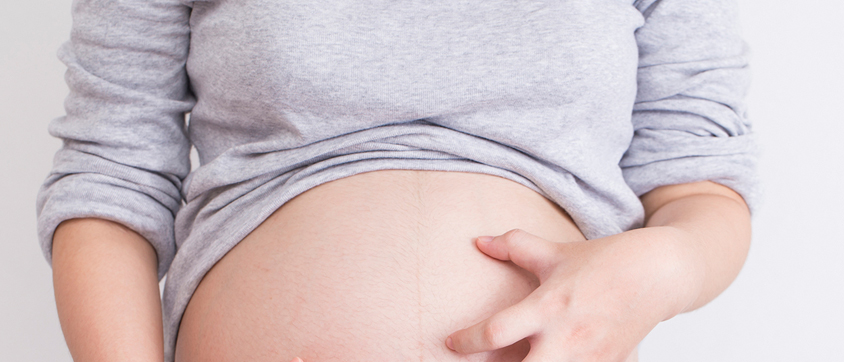Common symptoms in the seventh month of pregnancy are fluid retention, clumsiness, hot flashes and weight gain. Learn more about the symptoms experienced by seven month pregnant woman. There is a lot of weight gain during this period. There is a persistent feeling of clumsiness that is attributed to rapid weight gain. You will now find your uterus just positioned above just four inches above your belly button. Mothers report a common feeling as if they are running out of room for the baby. This is natural as the baby is rapidly growing in size and you are approaching your delivery date too. There is still about 10 more weeks for delivery and be prepared for the foetus inside you, the placenta and the uterus to grow even larger. In this articleWhere Does the Weight Come From?Pain and SwellingHot flashesWhere Does the Weight Come From? On an average, a seven month pregnant woman gains around 500 gms per week. The overall weight gain during the pregnancy term is about 12 to 16 kg. Almost half of this extra weight actually stems from the growth of the uterus, placenta, foetus and the increase in the volume of the amniotic fluid. There are several reasons for the common symptoms of clumsiness and dizziness in this period. Apart from the weight gain factor, such feelings stem from the indigestion problems. As the growing foetus is pressing against your stomach, your digestion process is sure to get affected as your digestive tract and intestines and liver and stomach is also feeling the pressure. This affects the secretion of enzymes and the absorption of food. The stomach will expand and the abdomen will grow larger. This will result is visible stretch marks on your stomach and thighs. Pain and Swelling During the seventh month of pregnancy, women experience enhanced swelling and pain in their joints and muscles. Due to the growth of the uterus, you can experience frequent back pain which at times might be similar to sciatic pain. Apart from the abdominal growth, there is another reason for this. As your delivery date draws near, your body also prepares itself in its own way for it. Your pelvic joints will start to loosen up during this period. The acute back pain also emanates from this aspect. Leg cramps, swelling and pain are common issues and can be dealt with if you enhance the calcium intake in your diet. Hot flashes This is another common symptom at this stage of pregnancy that is attributed to the ever changing hormone levels. The estrogen levels might suddenly plummet resulting in a surge of heat. This will make you feel warmer than usual and reach out for the AC in the middle of the night. These hot flashes are mostly felt around the neck region, head and chest. Feeling hot flashes is natural during pregnancy and almost 10% of women might feel this symptom more intensely than the rest. This feeling is a temporary one and can last from as little as 10-15 seconds to a couple of minutes. Remember, these hot flashes might continue post delivery too. The only thing that one needs to be careful about is by understanding the difference between a hot flash and fever. The best way to deal with hot flashes is by staying in a soothing environment and wearing comfortable clothes, preferably in layers. This will make it easier for you remove that shrug or linen shirt when you are feeling these flashes.
Common symptoms in the seventh month of pregnancy are fluid retention, clumsiness, hot flashes and weight gain. Learn more about the symptoms experienced by seven month pregnant woman. There is a lot of weight gain during this period. There is a persistent feeling of clumsiness that is attributed to rapid weight gain. You will now find your uterus just positioned above just four inches above your belly button. Mothers report a common feeling as if they are running out of room for the baby. This is natural as the baby is rapidly growing in size and you are approaching your
delivery date too. There is still about 10 more weeks for delivery and be prepared for the foetus inside you, the placenta and the uterus to grow even larger.
Where Does the Weight Come From?
On an average, a seven month pregnant woman gains around 500 gms per week. The overall weight gain during the pregnancy term is about 12 to 16 kg. Almost half of this extra weight actually stems from the growth of the uterus, placenta, foetus and the increase in the volume of the amniotic fluid.
There are several reasons for the common symptoms of clumsiness and dizziness in this period. Apart from the weight gain factor, such feelings stem from the indigestion problems. As the growing foetus is pressing against your stomach, your digestion process is sure to get affected as your digestive tract and intestines and liver and stomach is also feeling the pressure. This affects the secretion of enzymes and the absorption of food. The stomach will expand and the abdomen will grow larger. This will result is visible stretch marks on your stomach and thighs.
Pain and Swelling
During the seventh month of pregnancy, women experience enhanced swelling and pain in their joints and muscles. Due to the growth of the uterus, you can experience frequent back pain which at times might be similar to sciatic pain. Apart from the abdominal growth, there is another reason for this. As your delivery date draws near, your body also prepares itself in its own way for it. Your pelvic joints will start to loosen up during this period. The acute back pain also emanates from this aspect.
Leg cramps, swelling and pain are common issues and can be dealt with if you enhance the calcium intake in your diet.
Hot flashes
This is another common symptom at this stage of pregnancy that is attributed to the ever changing hormone levels. The estrogen levels might suddenly plummet resulting in a surge of heat. This will make you feel warmer than usual and reach out for the AC in the middle of the night. These hot flashes are mostly felt around the neck region, head and chest. Feeling hot flashes is natural during pregnancy and almost 10% of women might feel this symptom more intensely than the rest. This feeling is a temporary one and can last from as little as 10-15 seconds to a couple of minutes. Remember, these hot flashes might continue post delivery too. The only thing that one needs to be careful about is by understanding the difference between a hot flash and fever.
The best way to deal with hot flashes is by staying in a soothing environment and wearing comfortable clothes, preferably in layers. This will make it easier for you remove that shrug or linen shirt when you are feeling these flashes.


























